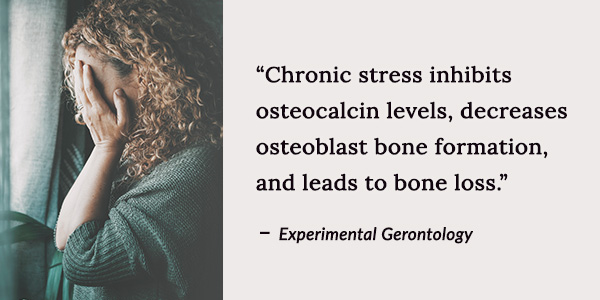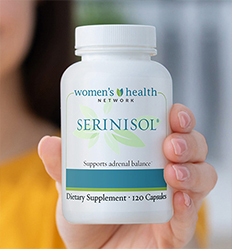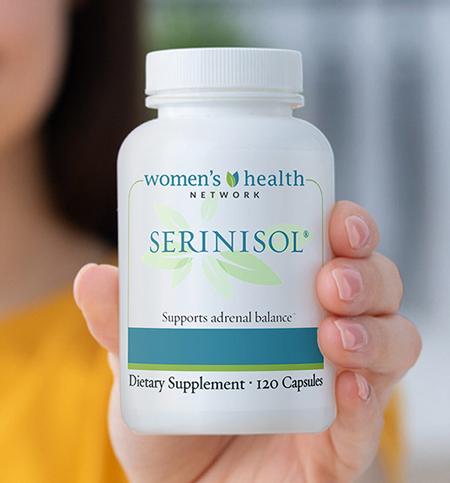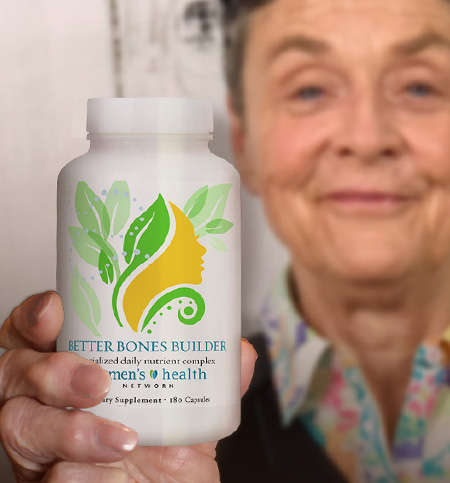Authored by Dr. Susan E. Brown, PhD
The link between stress hormones like cortisol and weakened bones is well-established, but there’s now some fascinating new science about just how deep this connection runs.

Osteocalcin: the bone protein that stress loves to steal
Recently, a groundbreaking study from Columbia University caught my attention. A renowned researcher, Professor Carsonski, has spent two decades studying a bone protein called osteocalcin. Why is osteocalcin so important? It’s a powerful protein produced by bone to trigger the creation of new bone cells — a key player in building and maintaining strong bones. But here’s the twist: this protein also plays a surprising role in how our bodies handle stress. In fact, it seems that osteocalcin is actually “sacrificed” by our bones during moments of extreme stress to protect us, and that’s where things get really interesting.
How stress changes osteocalcin’s role
Here’s what the researchers discovered: When we experience fear or a serious threat, our brain’s amygdala sends out an alarm signal. The amygdala is the part of the brain that processes fear and sends messages to prepare the body for danger. When triggered, the amygdala commands osteocalcin to flood into the bloodstream. The bone releases this protein, ensuring it is in an active state.
In this stress response, the osteocalcin protein is activated and sent from the bone into the blood, where it helps the body cope with the situation. It does this by taking on more glutamate, a neurotransmitter that keeps it active. Once in the blood, osteocalcin acts to turn off the parasympathetic nervous system, which normally helps us rest and recover. Instead, this shift keeps the body in a high-alert state.
The body’s balancing act
Our bodies use two major systems to maintain balance: the sympathetic and parasympathetic nervous systems. The sympathetic nervous system activates the “fight-or-flight” response, preparing the body for immediate action. This response shuts down non-essential functions like digestion and shifts energy toward survival. It’s the system that revs us up, sending energy and urgency through our body. On the other side is the parasympathetic nervous system, which is responsible for “rest and digest.” It’s what helps us relax, recover and return to a calm state once the danger has passed.
Unfortunately, many of us live in a state of chronic stress. It’s as if there’s always a tiger on our tail — an unending cycle of fear driven by modern-day worries like not having enough time, money or security. We create immense stress in our minds, and our complex environment adds to the burden. This constant activation of the fight-or-flight response takes a toll on our bones.
What this means for bone health
When osteocalcin leaves the bone to support the stress response, it prevents our body from shifting into a relaxation mode. As a result, the fight-or-flight state runs unchecked, fueled by stress hormones like cortisol, epinephrine and norepinephrine, which are produced by the adrenal glands. If the adrenal glands are weak or exhausted, osteocalcin acts as a backup to maintain this response. Even if the adrenals are functioning well, the body still uses — and sacrifices — this valuable bone protein to cope with stress.
Bones are the Great Giver
In many ways, our bones are incredibly selfless. They give up minerals like calcium to keep our body’s pH balanced and our blood calcium stable, which is essential for survival. And now, we know that bone also sacrifices osteocalcin to help us manage stress. Truly, bone is the great giver. But this means we have a responsibility to take care of our bones in return.
How to protect your bones
One of the best ways to prevent stress from draining your bone resources is to minimize the need for these emergency responses. Start with a good alkaline diet, ensure you’re getting all the essential bone nutrients and actively work to manage your stress levels.
Stress is an inevitable part of life, but a lot of it comes from the mental pathways we create. The good news is that science is discovering new ways to build healthier neural pathways. I’ll be sharing more about these exciting developments soon. For now, remember to take a deep breath, relax and support your skeleton — it truly takes care of you.











